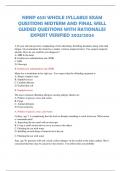Exam (elaborations)
NRNP 6531 WHOLE SYLLABUS EXAM QUESTIONS MIDTERM AND FINAL WELL GUIDED QUESTIONS WITH RATIONALES EXPERT VERIFIED 2023/2024
- Course
- Institution
NRNP 6531 WHOLE SYLLABUS EXAM QUESTIONS MIDTERM AND FINAL WELL GUIDED QUESTIONS WITH RATIONALES EXPERT VERIFIED 2023/2024
[Show more]



